Angela
Merkel
Bundeskanzlerin ,
* 17 July 1954 in Hamburg
Only three weeks
after
Angela Dorothea Kasner
was born, she was brought
by her parents, Horst and Herlind Kasner, in a pannier to Quitzow, a village in the Prignitz region of Brandenburg, in the German Democratic
Republic. Her family had made the unusual choice of moving to the East.
Having become a
pastor, Horst Kasner took the family three years later to Templin in the
Uckermark, where he founded a seminary and became director of a home for handicapped
persons. M.'s father had a
sympathetic relationship with the communist regime, and enjoyed a privileged social
status, having two cars and
the right to travel to Western Germany and even to Italy. His library was well-stocked with
western books. Horst Kasner became a leading member of the Weissensee Work Group, a “brotherhood of priests” who cooperated with the state
authorities. The
Stasi controlled the activities of the group which was instrumental in splitting the Protestant church in
Germany.
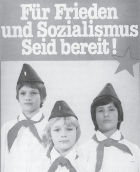
|
Angela
Kasner,
the eldest of three children, grew up in the Waldhof, a large wooded estate at the edge of Templin.
She joined the "Pionierorganisation Ernst Thälmann"
and the "Freie Deutschen Jugend (FDJ)", and took her "Jugendweihe". A star organiser in the
FDJ, she worked hard and achieved constantly high grades. She was top of the
class, winning a trip to Moscow because of her
exceptional performance in Russian. At Leipzig University, where she studied
physics, she
was an enthusiastic member of the FDJ, became " Kreisleitungsmitglied"
and was in charge of agitation and propaganda for the young Communists: „FDJ
Sekretärin für Agitation und Propaganda“. M. was a brilliant student, graduating as a doctor of
physics. For professional and political reasons, she often travelled within the Soviet bloc,
above all to Moscow.
She married a
physician, Ulrich Merkel, whom she soon divorced. She then moved in with Professor Joachim Sauer, divorced like herself but already the father of two
children.
After being awarded a doctorate (Dr. rer. nat.) based on a doctoral thesis on quantum
chemistry, she obtained a research post in quantum physics at the Academy of Sciences
in Berlin. In 1986, M. gained permission to attend a cousin's wedding in Hamburg, her first trip to the west.
After
the fall of the Berlin Wall in November 1989, the CIA attempted to take over by recruiting senior individuals under the old system who were willing to serve the USA like they had previously served the
USSR. One month later, M. changed sides and joined the "Demokratischer Aufbruch". She
took over the same functions that she had held before, except that the position was
now, in West German terminology, “Press
spokesperson”. However, it soon became known that the president of Demokratischer Aufbruch, Wolfgang Schnur, had been a collaborator of the
Stasi. M. herself informed the press of this painful news, obliging Schnur to resign and enabling herself to be appointed in his stead as president of the
movement.
Following the last parliamentary elections in the GDR in 1990, she joined the government of Lothar de Maizière, becoming the latter’s
spokesperson. Her partner, Joachim Sauer, was recruited by the US company Biosym Technology, spending a year at San Diego
(California) at the laboratory of this Pentagon contractor. He then joined
Accelrys, another San Diego company carrying out contracts for the Pentagon.
Once the Demokratischer Aufbruch had become part of the Christian Democratic Union (CDU),
M. was elected member of the
Bundestag and joined Helmut Kohl’s government. The communist Agitprop leader of the DDR youth movement had become a Christian Democrat minister of Youth in the Federal
Republic. Lothar de Maizière, who had become deputy president of the national
party, was convicted of having
relationships with the Stasi and was obliged to resign, to be replaced by M..
In 1994, Helmut Kohl appointed his protégée M. as Minister of the
Environment, the Protection of Nature and Nuclear Security. After assuming
office, M. sacked all the senior officials of her ministry.
In the September 1998 elections, the Christian Democrats were swept out of power by a wave of red and
green,
Gerhard Schröder becoming Chancellor, while M. was named Secretary-General of the CDU. Following a party financing
scandal, which compromised Kohl himself and party chairman Wolfgang Schäuble,
M. criticized her former mentor, Kohl, and advocated a fresh start for the party without
him. She was elected to replace Schäuble on 10 April 2000.
After Edmund Stoiber's defeat in the 2002 national elections against chancellor
Schröder, in addition to her role as CDU chairwoman, M. became leader of the conservative opposition in the
Bundestag. Her rival, Friedrich Merz was eased out to make way for M..
She advocated a strong transatlantic partnership and German-American
friendship, and came out in favour of the U.S. invasion of Iraq in the spring of
2003.
ABCD
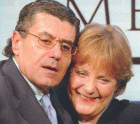
|
With
Chaim Saban

|
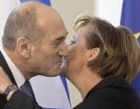
|
With Ehud
Olmert 
|

|
With
Benj.
Netanyahu

|

|
With
Nicolas
Sarkozy

|
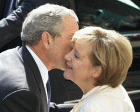
|
With
George
W. Bush

|
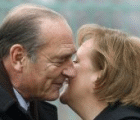
|
With
Jacques
Chirac

|
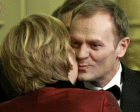
|
With
Donald Tusk 
|
From then on,
M. was publicly supported by two press groups. Firstly,
by Friede Springer, who had inherited the Axel Springer group (180 newspapers and
magazines, including Bild and Die Welt). The group’s journalists are required to sign an editorial agreement laying down that they must work towards developing transatlantic links and defending the state of Israel.
Second by her friend Liz Mohn, director of the Bertelsmann group, the number 1 in
the European media world (RTL group, Prisma group, Random House group, etc.). Ms. Mohn is also vice-president of the Bertelsmann
Foundation, an intellectual pillar of Europe-American relationships.
M.
relied
also on the advice of Jeffrey Gedmin, specially dispatched to Berlin to assist her by the Bush
clan. This lobbyist first worked at the American Enterprise Institute
under Richard Perle and Dick Cheney. He argued that the European Union should remain under NATO
authority.
Then Gedmin became director of the Aspen Institute in Berlin. In 2003, the
US State Department entrusted Jeffrey Gedmin and Craig Kennedy with a programme of “public
diplomacy”, including the funding of journalist and opinion formers in Western Europe.
In May 2004, she pushed through the election as President of the Federal Republic of the banker Horst Köhler, main author of the Maastricht Treaty and creator of the Euro, later president of the European Bank for Reconstruction and Development (EBRD) and director of the IMF.
At the beginning of the 2005 national electoral campaign, the CDU had a lead of 21 percentage points in public opinion
polls. It was then that her adviser, Jeffrey Gedmin, published an open letter to her in "Die Welt". After criticising the German economic
model, he wrote: “Before advancing the country, you need to defeat intellectually those nostalgic individuals who are dragging their
feet."
In reply to this invitation, M. promoted the former Constitutional Court judge Paul Kirchhof, and entrusted him with the
"Initiative Neue Soziale Marktwirtschaft". She announced the abolition of graduated income tax, proposing that the rate should be the same for those who only just have what is necessary and those who live in
luxury. Gerhard Schröder, severely criticised this proposal in a televised
debate. In the actual 2005 national elections, the CDU polled 35% of the votes and the SPD
34%. Following long and laborious negotiations, a Grand Coalition was agreed,
and M. was elected Chancellor on 22 November.
M.
then pushed through the participation of a German contingent in the multinational force under US command in Afghanistan.
In 2006, when Israel intervened in Lebanon, she achieved the involvement of the German
navy  .
From 1 January to 30 June 2007, M. assumed the presidentship of the European
Union and pushed the equivalent of the EU Constitutional Treaty project and the proposed merger of the North American Free Trade Area and the European Free Trade
Area, thereby creating a “great transatlantic
market”. .
From 1 January to 30 June 2007, M. assumed the presidentship of the European
Union and pushed the equivalent of the EU Constitutional Treaty project and the proposed merger of the North American Free Trade Area and the European Free Trade
Area, thereby creating a “great transatlantic
market”.
xxxxxxxxxxxxxxxxxxxxxxxxxxxxxxxxxxxxxxxxxxx
As the result of the German federal election in 2009, the CDU/CSU and FDP together
held 332 seats (of 622 total seats) and had been in coalition since 27 October 2009.
M. was re-elected as chancellor, and Guido Westerwelle (FDP) served as the Foreign Minister.
Until the year 2013, M. succeeded in reducing the weight of Westerwelle's
FDP from 14.6% to 4.8%, resulting in the elimination of the FDP from the
'Bundestag' at the the German federal election in 2013.
xxxxxxxxxxxxxxxxxxxxxxxxxxxxxxxxxxxxxxxxxxxxxxxxxxxxxxxxxxxx
Now the CDU/CSU and
SPD together hold 504 seats (of 631 total seats).
M. was re-elected as chancellor, and Sigmar Gabriel (SPD) serves as Minister
for Economy and Energy. At the end of February 2014, M. arranged for a
meeting of her government team in Jerusalem, in order to receiving the
benediction of Israel for her governorship under the joint rule of USrael.
Letzte Änderung / Last update:
17.03.2014
|